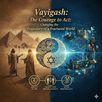Can We Trust Our Own Judgment? A Deeper Look at Human Bias
- Rabbi Yosef Vogel

- Feb 21, 2025
- 2 min read
We like to believe we can be intellectually honest, even when judging matters in which we have a personal stake.
But would you trust someone else’s judgment if they had a conflict of interest?
Mystics teach that human consciousness operates on three levels.
At our core, we are wired for self-preservation. This is our default setting—shaping all our judgments and decisions, both consciously and subconsciously, to serve our own interests. This is known as the Animal Soul.
Beyond this biological instinct, we possess intelligence—the capacity to discern truth from falsehood with objectivity.
Yet, as central as this Intellectual Soul is to our identity, it remains suspect. For beneath even our most rational thinking lies a web of self-serving impulses, subtly shaping our perception of truth.
Then there is the deepest level of consciousness: the G-dly Soul.
Its essence defies definition, yet it is here that our conscience resides—constantly seeking purpose beyond itself, striving to align with a transcendent reality.
At its core, this soul is our truest identity—the part of us that transcends the material, even the body itself.
While intelligence enables us to distinguish between true and false, only the soul grants us a sense of pure, unadulterated morality. For only by rising above self-interest can we arrive at a truth that is free from human bias.
This is why the story of the Jewish people begins with the revelation at Mount Sinai. Only when anchored in something beyond ourselves can we secure a just and sustainable existence for all humanity.
To be human is to wrestle with what is best for ourselves and others. This is why we must look beyond our own limitations for guidance and inspiration, especially in times of profound moral confusion.






Comments